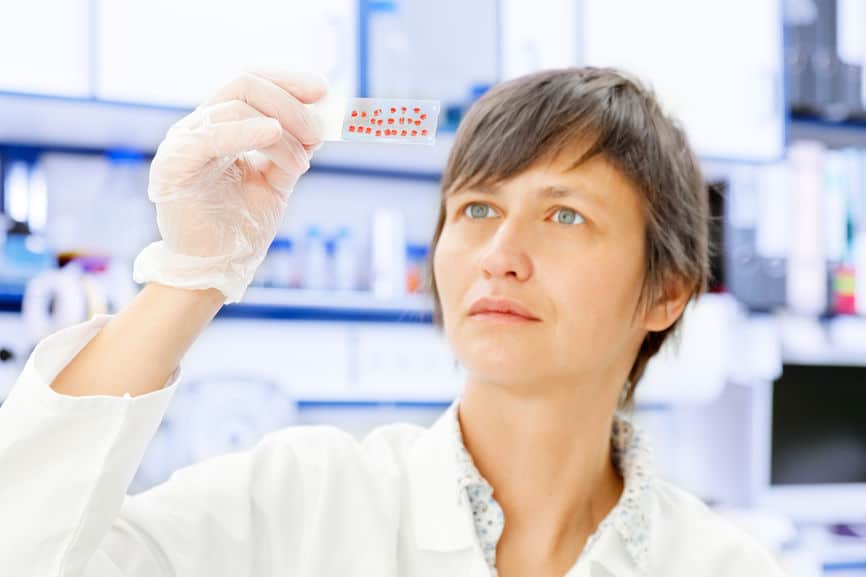
Previous
The Advantages of Consuming Protein for Liver Health

Next
Emricasan Hoping to Be First Fatty Liver Drug
Could Liver Cancer Cells Have an Upside?
Have you heard that specialized liver cancer cells are part of an elaborate, investigational treatment for end stage liver disease?
Advanced Hepatitis C infection could lead to end stage liver disease – a severe condition in which a liver transplant is the only solution. Unfortunately, many with end stage liver disease must wait a long time for a suitable organ for transplant. Keeping affected individuals alive while they wait for a new liver is a tremendous challenge – one where a solution may lie just over the horizon.
Currently in phase 3 testing, ELAD is a potential treatment that could be a lifesaver for those in end stage liver disease.
The ELAD system is a bio-artificial liver support system that operates outside the body. It is designed to allow the patient’s own liver to regenerate to a healthy state, or to stabilize the patient until a liver transplant is available. Surprisingly, ELAD makes good use of something most of us would consider harmful: human liver cancer cells.
Kidney Dialysis
The whole concept of a bio-artificial organ system to sustain those with a life-threatening illness is not new. This is exactly why kidney dialysis was first invented in 1943; to prevent end stage kidney failure from being fatal. The body’s kidneys help filter waste, excess fluid and toxins from the blood. If they can’t function, toxins build up in the body, blood pressure can rise and too much fluid can collect in the body’s tissues causing extreme swelling.
Kidney dialysis is a life support treatment that uses a special machine to filter harmful wastes, salt and excess fluid from the blood – restoring the blood to a normal state. For the most part, dialysis can mimic kidney function because the kidneys perform a relatively simple, replicable function.
Unfortunately, creating a similar type of life support treatment for the liver has proven to be much more complicated. This is because the liver performs over 500 biological functions. As such, actual living liver cells are required to mimic liver function.
Regrettably, liver cells (hepatocytes) begin to perish soon after they are removed from the body.
Liver Cancer Cells
Vital Therapies, the biotherapeutic company behind ELAD, has discovered that there is one kind of special liver cell that can survive outside the body – hepatoblastoma. Typically affecting young children, hepatoblastoma is a type of liver cancer that usually does not spread outside the liver.
Cancer usually elicits fear, and for good reason. According to the American Cancer Society, cancer is the second most common cause of death in the U.S., accounting for nearly 1 of every 4 deaths. However, two important facts about liver cancer cells make them an ingenuous ingredient for creating a bio-artificial liver support system:
- Liver cancer cells inside the body are harmful because they grow, spread and crowd out other organs.
- Liver cancer cells outside the body perform similarly to normal liver cells and pose no real threat.
Thus, the hepatoblastoma cells used in the ELAD system can function as surrogate liver cells without causing harm.
Instead of calling them hepatoblastoma cells, Vital Therapies has named the cancer cells VTL C3A cells in their ELAD system. Although they are analogous, this renaming is likely to circumvent any fear associated with cancer.
ELAD – The Liver Version of Dialysis
Treatment with ELAD is a multi-step process. Greatly simplified, ELAD involves the following:
- From a central venous line, blood is drawn from the patient and passed into a system that isolates the blood’s plasma infiltrate.
- The plasma infiltrate is then moved through four hollow cartridges where it contacts the VTL C3A cells that mimic liver function.
- The treated plasma infiltrate is then filtered and reconstituted with blood cells and returned back to the patient.
Data from ELAD clinical studies have shown significant potential to increase survival rates in people with acute liver failure. Although there are no claims that ELAD can remove Hepatitis C particles from the blood, it has great potential for those with end-stage liver disease – regardless of the cause.
While the safety, efficacy and approval of ELAD remains to be seen, the results thus far have been encouraging. Phase 3 trial results are due out in April of 2015, potentially giving those with end stage liver disease an entirely new appreciation for liver cancer.
http://vitaltherapies.com/elad/technology/, ELAD® Concept, Retrieved April 5, 2015, Vital Therapies, Inc., 2015.
http://www.cancer.org/research/cancerfactsstatistics/cancerfactsfigures2014/, Cancer Facts & Figures 2014, Retrieved April 5, 2015, American Cancer Society, Inc., 2015.
http://www.childrenscancer.org/main/liver_cancer_hepatoblastoma/, Liver Cancer/Hepatoblastoma, Retrieved April 5, 2015, Children’s Cancer Research Fund, 2015.
http://www.davita.com/kidney-disease/dialysis/motivational/the-history-of-dialysis/e/197, The History of Dialysis, Retrieved April 5, 2015, DaVita HealthCare Partners, Inc., 2015.
https://www.kidney.org/atoz/content/dialysisinfo, Dialysis, Retrieved April 5, 2015, National Kidney Foundation, Inc., 2015.
http://www.stockhouse.com/news/press-releases/2015/03/26/using-cancer-to-treat-liver-failure-and-insecticides-to-filter-viruses-from, Using Cancer to Treat Liver Failure and Insecticides to Filter Viruses from Blood, Crazy or Genius?, Retrieved April 5, 2015, Stockhouse Publishing, Ltd., 2015.
http://www.webmd.com/a-to-z-guides/kidney-dialysis, Kidney Dialysis, Retrieved April 5, 2015, WebMD, LLC, 2015.






